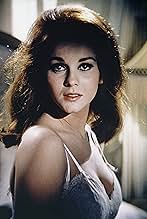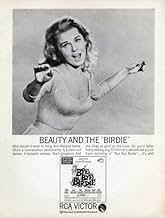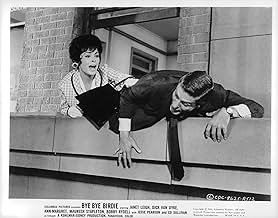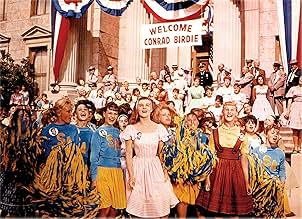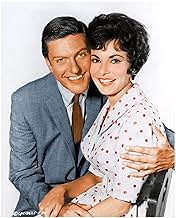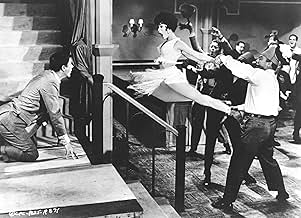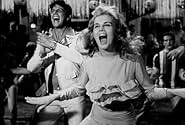IMDb रेटिंग
6.6/10
9.8 हज़ार
आपकी रेटिंग
अपनी भाषा में प्लॉट जोड़ेंA rock singer travels to a small Ohio town to make his "farewell" television performance and kiss his biggest fan before he is drafted.A rock singer travels to a small Ohio town to make his "farewell" television performance and kiss his biggest fan before he is drafted.A rock singer travels to a small Ohio town to make his "farewell" television performance and kiss his biggest fan before he is drafted.
- निर्देशक
- लेखक
- स्टार
- 2 ऑस्कर के लिए नामांकित
- 7 कुल नामांकन
फ़ीचर्ड समीक्षाएं
The vitriol below from fans of the Broadway original is absurd. Yes, this is not a filmed version of the stage play - GET OVER IT! What we have is a funny, smart, classic film musical that gets virtually everything right. Dick Van Dyke reprises his Broadway role while at the peak of his career, Paul Lynde gives his best film performance, Maureen Stapleton milks her part for all it's worth, and Ann-Margret is simply astounding! The only casting error is Janet Leigh - but they needed a name, since everyone else in the cast was unknown at the time. While Leigh gives a solid performance, songs had to be cut since she could sing only with difficulty. But this is a minor flaw - everything else about this film is spot on, as demonstrated by the sad effort to redo it for TV in 1995. It captures the era perfectly - of course, it's dated: it's about America in the early 60s! If it wasn't dated, it wouldn't work! So if you haven't seen it, get it - I just watched in in NYC's Bryant Park with thousands of jaded New Yorkers, and it won over that audience completely. Enjoy!
This musical, for those of us who were of the age then, represents a time and a place we thought would not end. Entering our early teens in suburbia, begat of young war veterans, the biggest issues in our lives were those reflected in this film; who pinned who and the adulation of our musical icons. The whole world was Sweet Apple and "someday we would find out this was what life was all about" as Kim sings to a befuddled Hugo. Even nerds could fall in love. And an equal force in our weekly lives was the Sunday ritual of The Ed Sullivan Show. This is a beautiful homage to that world that would end seven months later in Dallas and bring with it the counter culture, riots and Viet Nam. Hard to put on a happy face... But you will with this score. More fifties and Bosa Nova then the hip sixties it is toe tapping and gets under your skin. Worth repeat viewings. And as always "I gotta be sincere..if you feel it in here.." and I still do.
When 'Bye Bye Birdie' was the hit of the '59-'60 season on Broadway, it was as much for its satirical edge as for the talent on stage or the innovative direction by Gower Champion. By that time it was only too clear to savvy adults that Elvis Presley and rock'n'roll had been thoroughly co-opted and mainstreamed by Hollywood and Madison Avenue. For all its supposed danger and subversiveness in 1956, Rock was a pop culture commodity like any other by the end of the decade.
And by the time BYE BYE BIRDIE hit the screen in 1963, that point was too obvious to have any edge. Presley had long since become a bland and unfashionable movie personality, and rock itself had devolved into the kind of inconsequential June/Moon tunes that in a slightly different form had been hit parade staples for decades.
So the point is, the teen world BYE BYE BIRDIE was parodying was largely gone by that time already. Just a year later, when the Beatles appeared on Ed Sullivan (ironically he was still a King Maker but not for much longer) that world began to dissolve and reform unforgettably. So BIRDIE is the swan song for an era and an expression of Baby Boom nostalgia for kids who were too young to have enjoyed the '50s in quite the same way their older brothers and sisters had. How many children in '63 thrilled to the vigorous twitching of Ann-Margret and Bobby Rydell, hoping that was the teen world that awaited them in the future, only to discover by '68 that alienation and anger were the currency of the day? Not that those emotions were misplaced -- the times themselves demanded them. But there was a sense of loss too, a sense that we had been cheated out of fun: silly, twitchy dances and full skirts and snug pastel pullovers. There's a reason this film made an indelible impression on children then, and perhaps most on girls and gay boys.
It was an old-fashioned musical in a movie era that was confused but evolving rapidly, and Ann-Margret was a transitional star of that moment. A throwback to another Hollywood, she gets the traditional star buildup here, and it works spectacularly. Like Rita Hayworth in GILDA, A-M was the good/bad girl -- fresh and sweet and direct enough to please any elder, but with a smoldering animal eroticism so potent the screen seemed barely able to contain it. She is hot in the runway opening and delicious thereafter but she doesn't really become a star until a pivotal moment in the 'Got A Lot Of Livin' To Do' number when her eyes narrow, she smiles and grits her teeth and her hands envelope the head of a chorus boy while she parses out the lyrics of female sexual emancipation -- Daddy won't know his daughter indeed.
It was a sexual call to action that kids understood and responded to. So THIS was what being a teenager would be like! In that moment and the few minutes that followed, even gay boys felt the tops of their heads come off. It's an excitement that doesn't return until the coda: once again A-M is on the runway, but this time any pretense that she is sweet, innocent Kim McAfee has gone -- this is Ann-Margret, and the sexual light and heat of a new star is palpable. Unfortunately, she was almost immediately to become outdated. Within a few years she was a joke in pictures, and had to wait until 1971 and CARNAL KNOWLEDGE to make a 'comeback' -- at the age of 30, no less. She had made the mistake of starting too late, and being too traditional a Hollywood star just when Hollywood decided to do away with stars, at least those that were provokingly lovely.
So BIRDIE trembled on the edge of a new, harsher era, and those of us who were caught on the cusp of that upheaval feel great affection for the fantasy of rock stars like Birdie, for Sweet Apple High, and for the bouncy, shiny, crisp teenagers we never were.
And by the time BYE BYE BIRDIE hit the screen in 1963, that point was too obvious to have any edge. Presley had long since become a bland and unfashionable movie personality, and rock itself had devolved into the kind of inconsequential June/Moon tunes that in a slightly different form had been hit parade staples for decades.
So the point is, the teen world BYE BYE BIRDIE was parodying was largely gone by that time already. Just a year later, when the Beatles appeared on Ed Sullivan (ironically he was still a King Maker but not for much longer) that world began to dissolve and reform unforgettably. So BIRDIE is the swan song for an era and an expression of Baby Boom nostalgia for kids who were too young to have enjoyed the '50s in quite the same way their older brothers and sisters had. How many children in '63 thrilled to the vigorous twitching of Ann-Margret and Bobby Rydell, hoping that was the teen world that awaited them in the future, only to discover by '68 that alienation and anger were the currency of the day? Not that those emotions were misplaced -- the times themselves demanded them. But there was a sense of loss too, a sense that we had been cheated out of fun: silly, twitchy dances and full skirts and snug pastel pullovers. There's a reason this film made an indelible impression on children then, and perhaps most on girls and gay boys.
It was an old-fashioned musical in a movie era that was confused but evolving rapidly, and Ann-Margret was a transitional star of that moment. A throwback to another Hollywood, she gets the traditional star buildup here, and it works spectacularly. Like Rita Hayworth in GILDA, A-M was the good/bad girl -- fresh and sweet and direct enough to please any elder, but with a smoldering animal eroticism so potent the screen seemed barely able to contain it. She is hot in the runway opening and delicious thereafter but she doesn't really become a star until a pivotal moment in the 'Got A Lot Of Livin' To Do' number when her eyes narrow, she smiles and grits her teeth and her hands envelope the head of a chorus boy while she parses out the lyrics of female sexual emancipation -- Daddy won't know his daughter indeed.
It was a sexual call to action that kids understood and responded to. So THIS was what being a teenager would be like! In that moment and the few minutes that followed, even gay boys felt the tops of their heads come off. It's an excitement that doesn't return until the coda: once again A-M is on the runway, but this time any pretense that she is sweet, innocent Kim McAfee has gone -- this is Ann-Margret, and the sexual light and heat of a new star is palpable. Unfortunately, she was almost immediately to become outdated. Within a few years she was a joke in pictures, and had to wait until 1971 and CARNAL KNOWLEDGE to make a 'comeback' -- at the age of 30, no less. She had made the mistake of starting too late, and being too traditional a Hollywood star just when Hollywood decided to do away with stars, at least those that were provokingly lovely.
So BIRDIE trembled on the edge of a new, harsher era, and those of us who were caught on the cusp of that upheaval feel great affection for the fantasy of rock stars like Birdie, for Sweet Apple High, and for the bouncy, shiny, crisp teenagers we never were.
With the gift of a DVD by a good friend, I have now viewed BBB for the first time in over 20 years. And the comments here astound me: so many people coming to a message board to complain on a film that isn't a stage show. Or a book. Or an editorial. Different media sometimes (not always, to be sure) necessitate a change or alteration in a story adaptation. Yes, Rosie's ethnicity is down pedaled in the film (mainly because Chita Riviera wasn't in it), but they don't eliminate it entirely by the inclusion of a hideous black wig on Janet Leigh. I didn't miss Albert not being an English teacher as opposed to a chemist at all; it doesn't change the essence of his still-henpecked-by-his-mother character. On a different matter, I'm a little surprised to learn that Dick Van Dyke apparently had a bruised ego because of the strong emergence of co-star Ann-Margret in the film (his name still comes before hers, f'heaven's sakes!), but what can you do? The film is a fun, bright, pseudo-satire of the generation gap, teens, Elvis, and most of all, Ed Sullivan!! The finer numbers include the A-M introduction in "How Lovely to be a Woman" followed by the insane ensemble piece "Sincere-" which contains one of the funniest closing camera pans ever used in a film. "Kids" is also fine, but "Put on a Happy Face" is hampered by the limited dancing ability of Janet Leigh- through no fault of her own, mind you, but an obvious hole in what should have been a boy-girl dance duet (which they try to hide with excessive trick camera effects). The film's standout number, IMO, is "A Lot of Livin' to Do-" a nightclub extravaganza sung by THREE different leads advancing two different plots of the story at once. With stellar direction by George Sidney and inventive choreography by Onna White, it first appears as a conventional girl-swooning solo for the title character, but quickly shifts to the cat-and-mouse antics of torn lovers A-M and Bobby Rydell, who lead the entire club in a kind of challenge dance. And while it isn't her first film, this is the scene (for me, anyway) which shows A-M's breakout performance, dancing in a bare midriff and pair of hot-pink capris- and she blows the roof off the place. No surprise that the next year she was cast opposite Elvis himself. Check it out, and try not to break into dance yourself, I dare you!!
I am usually in the corner of those who complain about how Hollywood generally altered many classic Broadway stage musicals into something radically different when they were made into movies. Most of the time, the changes were ridiculous and weakened the property dramatically.
"Bye Bye Birdie" though, is the rare exception where the changes made to get it to the big screen were absolutely necessary. And nothing demonstrates this more than the fact that the faithful 1995 TV version is a lumbering, slow-moving mess that manages to demonstrate perfectly how what plays great on the stage does not always translate effectively to the film medium.
By contrast, the 1963 film version decided to make itself a bright, colorful film extravaganza that played to the strengths of the film medium. And the results in my opinion, worked wonderfully.
To a stage fan like "citybuilder" who rips the changes from the play, he needs to stop and think of how the structure of the stage version, which has the Sullivan show moment and the punching of Conrad as an Act I finale, would never have worked on film. It simply makes more cinematic sense to move that to the end. And the whole big deal over Rose's ethnicity, which was really done to showcase the talent of Broadway lead Chita Rivera, would have been a distraction as well because spotlighting Albert's mother as a racist would have gone against the whole tone of the movie (and truth be told "Spanish Rose" is not that great a song). Likewise, it's better to have Albert sing "Put On A Happy Face" to Rose rather than a nameless Conrad Birdie fan we never see again.
Dick Van Dyke and Paul Lynde offer the right amount of gravitas from the Broadway cast, Janet Leigh in her black wig gets to show off her dancing talent which she seldom got a chance to do (her singing is admittedly a bit thin, but she gets by), and of course Ann-Margret totally elevates the role of Kim McAfee into a star vehicle, and who can blame them for doing this? Her rendition of the title song written for the film is enough to leave one gasping for air, yet she still manages to be convincing as the wide-eyed teenager just the same.
Ultimately, stage fans can be satisfied that they got the version they prefer done on film (though it should be noted that the 95 version is not a pure rendition of the 1960 stage script, but rather the 1991 touring revival), but movie fans got the better end of things with this version in 1963. It will never be among the great movie musicals, but it is two solid hours of colorful early 60s fun.
"Bye Bye Birdie" though, is the rare exception where the changes made to get it to the big screen were absolutely necessary. And nothing demonstrates this more than the fact that the faithful 1995 TV version is a lumbering, slow-moving mess that manages to demonstrate perfectly how what plays great on the stage does not always translate effectively to the film medium.
By contrast, the 1963 film version decided to make itself a bright, colorful film extravaganza that played to the strengths of the film medium. And the results in my opinion, worked wonderfully.
To a stage fan like "citybuilder" who rips the changes from the play, he needs to stop and think of how the structure of the stage version, which has the Sullivan show moment and the punching of Conrad as an Act I finale, would never have worked on film. It simply makes more cinematic sense to move that to the end. And the whole big deal over Rose's ethnicity, which was really done to showcase the talent of Broadway lead Chita Rivera, would have been a distraction as well because spotlighting Albert's mother as a racist would have gone against the whole tone of the movie (and truth be told "Spanish Rose" is not that great a song). Likewise, it's better to have Albert sing "Put On A Happy Face" to Rose rather than a nameless Conrad Birdie fan we never see again.
Dick Van Dyke and Paul Lynde offer the right amount of gravitas from the Broadway cast, Janet Leigh in her black wig gets to show off her dancing talent which she seldom got a chance to do (her singing is admittedly a bit thin, but she gets by), and of course Ann-Margret totally elevates the role of Kim McAfee into a star vehicle, and who can blame them for doing this? Her rendition of the title song written for the film is enough to leave one gasping for air, yet she still manages to be convincing as the wide-eyed teenager just the same.
Ultimately, stage fans can be satisfied that they got the version they prefer done on film (though it should be noted that the 95 version is not a pure rendition of the 1960 stage script, but rather the 1991 touring revival), but movie fans got the better end of things with this version in 1963. It will never be among the great movie musicals, but it is two solid hours of colorful early 60s fun.
क्या आपको पता है
- ट्रिवियाIronically, Bobby Rydell, who plays the timid Hugo Peabody, was himself a national teen idol before and after the film's production. In fact, in contrast to the original stage musical where Michael J. Pollard played the role, the part of Hugo was expanded significantly in the film to accommodate his teen celebrity.
- गूफ़After Rosie pulls the McAfee family out of the audience at Toast of the Town (1948), two different shots of the Russian conductor show the McAfees still sitting in the audience.
- भाव
Rose DeLeon: I must be the prized dope of all-time... thinking I could pry you away from your mama's ever-lovin' tentacles.
- क्रेज़ी क्रेडिटThere is no "The End" credit or cast list at the end of the film. Ann-Margret simply sings an on-screen reprise of the song "Bye Bye Birdie" at the end, and then says " 'Bye, now!".
- कनेक्शनEdited into Histoire(s) du cinéma: Seul le cinéma (1994)
- साउंडट्रैकBye Bye Birdie
Music by Charles Strouse
Lyrics by Lee Adams
Performed by Ann-Margret before the title credits, with Johnny Green and the Columbia Studio Orchestra and Chorus
Reprised by Ann-Margret in the finale
टॉप पसंद
रेटिंग देने के लिए साइन-इन करें और वैयक्तिकृत सुझावों के लिए वॉचलिस्ट करें
- How long is Bye Bye Birdie?Alexa द्वारा संचालित
विवरण
- रिलीज़ की तारीख़
- कंट्री ऑफ़ ओरिजिन
- भाषाएं
- इस रूप में भी जाना जाता है
- Adiós, ídolo mío
- फ़िल्माने की जगहें
- उत्पादन कंपनी
- IMDbPro पर और कंपनी क्रेडिट देखें
बॉक्स ऑफ़िस
- US और कनाडा में सकल
- $1,31,29,412
- चलने की अवधि1 घंटा 52 मिनट
- रंग
- पक्ष अनुपात
- 2.35 : 1
इस पेज में योगदान दें
किसी बदलाव का सुझाव दें या अनुपलब्ध कॉन्टेंट जोड़ें




